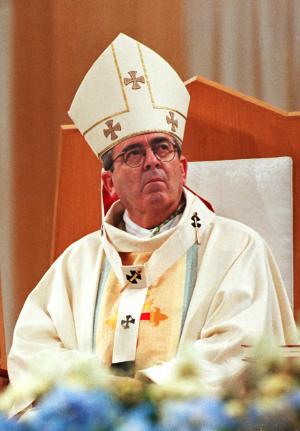Issue Date: August 1, 2003
St. Louis archbishop known as 'friend of Rome,' promoter of orthodoxy By JOE FEUERHERD Appointed to head the Philadelphia archdiocese July 15, Archbishop Justin Rigali promises few surprises -- which is probably one reason he got the job. As St. Louis archbishop since March 1994, the 68-year-old California native was known for doctrinal orthodoxy and quality administration. On the former, he was meticulous in implementing the recent changes in the General Instruction on the Roman Missal (“It is fitting,” Rigali wrote in his archdiocesan newspaper column, “that we limit [the sign of peace at Mass] to a few around us”) and he strongly encouraged eucharistic adoration at every parish. He is a prodigious fundraiser who put the St. Louis church on solid financial footing while implementing the archdiocese’s first strategic plan. Other highlights of his St. Louis tenure:
“I’m happy to hear they [St. Louis high school teachers] had a good relationship with the archbishop and I’d like to see that continue in Philadelphia, but I know there are going to be some hard questions,” said Rita Schwartz, president of the Philadelphia-based National Association of Catholic School Teachers. A potential early test: The contract for more than 1,000 Philadelphia Catholic high school teachers expires next month and the teachers are threatening to strike if a new agreement is not reached. Meanwhile, victims of clerical sexual abuse and their advocates were critical of the appointment. Rigali is “among the least open and compassionate of bishops,” said Barbara Dorris, leader of the St. Louis branch of the Survivors Network of those Abused by Priests, SNAP. “Rigali has been inaccessible and unsympathetic toward victims,” she said, and has “severely mishandled a number of cases.” On a personal level, said Robert Schutzius, a former St. Louis archdiocesan priest and secretary of the Association for the Rights of Catholics in the Church, Rigali is “very cordial, very helpful, very Christian.” But he was “very reluctant” to meet with critics of the church or groups considered less than orthodox, including a group of former priests and nuns who had met with his two predecessors, Archbishop John May and Cardinal John Carberry. Likewise, said Dorris, “neither he nor anyone on his staff has met with our local SNAP chapter, despite repeated efforts on our part.” “Aloofness would probably best describe his methods, his modus operandi,” said Drake, former teachers union president. Rigali’s appointment, said the Jesuit church historian Fr. Gerard Fogarty, “is an indication that Vatican officials are pleased with his handling of St. Louis.” It is also an indication, said Fogarty, that Rigali -- who served as a Vatican official in numerous capacities over more than 30 years -- has friends in Rome. In 1964, Rigali was awarded a doctorate in canon law from Rome’s Pontifical Gregorian University, and then began studies at the Pontifical Ecclesiastical Academy (of which, in 1985, he became president), the training ground for Vatican diplomats. In the late 1960s, he served as the apostolic nuncio in Madagascar, and then, beginning in February 1970, as director of the English language section of the Vatican Secretariat of State and as English language translator for Pope Paul VI. Ordained a bishop in 1985, he continued his service in various Vatican departments, including the Council for Public Affairs of the Church, the Congregation for Bishops and the Pontifical Council for the Laity. In 1989 he was named secretary of the Congregation for Bishops. He serves on the advisory board of Catholics United for the Faith, a conservative organization based in Steubenville, Ohio. Rigali fits the Philadelphia episcopal mold. Among his predecessors was Cardinal Dennis Dougherty, of whom historian Charles R. Morris wrote: “Of all the American prelates, in an age when the American church’s loyalty to Rome was at a high pitch, Dougherty was ‘Romanissimus,’ the most devoted of all, to the point of servility.” Rigali’s two immediate predecessors -- Cardinals John Krol and Anthony Bevilaqua -- were likewise known for their doctrinal conservatism. Krol, for example, didn’t allow Saturday vigil Masses until 1983, long after every other U.S. diocese adopted the practice, while Bevilaqua initially would not allow women to participate in the Holy Thursday ritual washing of the feet. Both had strong ties to Rome. Rigali will be installed as Philadelphia archbishop Oct. 7. No successor has been named to the St. Louis position he is vacating. Joe Feuerherd is NCR Washington correspondent. His e-mail address is jfeuerherd@natcath.org National Catholic Reporter, August 1, 2003 |
